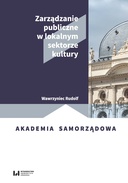Explore

Zarządzanie publiczne w lokalnym sektorze kultury
Wawrzyniec Rudolf
2020
0 Ungluers have
Faved this Work
Login to Fave
Public management has been an area of dynamic development for years, both in terms of scientific research and practical action. This study deals with public management in cultural sector, which in Poland is dominated by public and social actors. The territory's cultural potential can constitute its development foundation and more and more cities and regions are taking efforts to take advantage of these values. When considering the specificities of public management in the field of cultural sector, the author argues that systemic and organizational solutions based on a market approach are not fully applicable in this sector and show defects that could result in dissatisfaction and resistance of the part the directors of city cultural institutions and their staff. The specificity of culture and employees of the cultural sector communities professionally connected with culture is not conducive to the introduction of solutions for which rigid regulations, quantitative tasks or competition for clients are the daily context of the activities carried out. The study highlights the social nature of the cultural sector, which makes it difficult to apply market-based performance improvement actions and instruments, based on financial motivation or individualistic approach. The study provides an in-depth analysis of the relationship between the city administration acting on behalf of local authorities, on the one hand, and the directors of museums, theatres, cultural centres or galleries (cultural institutions) that belong to the city and are financed from local budget. The monograph aims to analyze this relation in the light of two theories: agency and stewardship. Using both theories, which are part of the institutional economy, the author intends to answer the question of how much these relationships can be described by the agency's theory of market-based NPM model, and to what extent by stewardship's theory, which is part of a relational NPG model, based on interaction and trust. The monograph, due to the empirical material obtained from the selected city of Lodz, also has application value. The conclusions drawn may prove useful for those cities which intend to use the sphere of culture in promoting their socio-economic development. The presented proposals for solutions, in terms of optimizing the management of the relationship: authorities/administration – the directors of the cultural organizations were inspired by the statements of respondents representing both sides of the analyzed relations.
This book is included in DOAB.
Why read this book? Have your say.
You must be logged in to comment.
Rights Information
Are you the author or publisher of this work? If so, you can claim it as yours by registering as an Unglue.it rights holder.Downloads
This work has been downloaded 28 times via unglue.it ebook links.
- 28 - pdf (CC BY-NC-ND) at Unglue.it.
Keywords
- agency theory
- cultural institutions
- New Public Management
- public governance
- public management in sector of culture
- stewardship theory
Links
DOI: 10.18778/8220-379-0Editions

